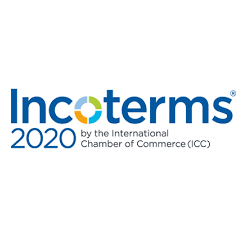Introduction:
The Incoterms Rules are standard trade terms issued by the International Chamber of Commerce (ICC). They are a set of rules outlining the standard commercial terms used in contracts for the sale of goods, and are to divide transaction costs and responsibilities between buyer and seller. There are 11 various standard trading terms:
| Rules for any mode or modes of carriage | Rules for Sea and Inland Waterway Transport |
| EXW (Ex Works) | FAS (Free Alongside Ship) |
| FCA (Free Carrier) | FOB (Free On Board) |
| CIP (Carriage and Insurance Paid To) | CFR (Cost and Freight) |
| CPT (Carriage Paid To) | CIF (Cost Insurance and Freight) |
| DAP (Delivered at Place) | |
| DPU (Delivered at Place Unloaded) | |
| DDP (Delivered Duty Paid) |
Revision:
The Incoterms Rules have guided, facilitated, and assisted in regulating sale purchase agreements by allowing parties to incorporate responsibilities for each party, including the transfer of risk from seller to buyer, as well as specify the loading and unloading responsibilities of the buyer and seller. These terms are known as the international standard and are recognized by governments, legal authorities, practitioners, and custom authorities around the world for use in international trade. The Incoterms Rules are not implied; they must be precisely stated in the contract. The terms merely set out the obligations, but the specific manner of performance is left open to the parties.
The revisions to Incoterms® 2010 Rules are in part to encourage parties to consider more carefully the particular Incoterms Rules they choose to incorporate, by promoting a better understanding of the operation of the rules of incorporation. Their main focus is the issue of the transfer of risk from seller to buyer defined in terms of “delivery.” They also highlight other responsibilities such as insurance, export and import clearance, and the division of other costs involved in the physical delivery of the goods from buyer to seller. The Incoterms 2020 revision (ICC publication no. 723) came into force on 1 January 2020.
Changes:
Bills of lading: FOB (free on board) should not usually be used for container shipments. This is because a seller generally be unable to control the container once it arrives at the port of export before the container is loaded. However, FOB means the seller accepts all the risk and cost of the export, port terminal handling charges and loading costs/risks. Sellers should then use FCA (Free Carrier). Nevertheless, numerous sellers still use FOB since the letter of credit from the bank often requires an onboard bill of lading for the seller to get paid. As under FOB the seller is responsible for loading, they have a higher chance of getting an onboard bill of lading. Hence, to try and help people to use FCA, FCA has changed to permit the buyer and seller to agree that the seller will receive an onboard bill of lading.
Insurance under CIF (carriage insurance and freight) and CIP (carriage and insurance paid to): The Incoterms® rule, CIP means that the seller is only accountable for delivery of the goods to the carrier but pays for the carriage and insurance of the goods to the named destination. CIF is the same, except that it can only be used for maritime transport. In Incoterms® 2020, CIF preserves the same insurance necessities as in Incoterms® 2010, but CIP has increased the level of insurance required to be obtained by the seller. This is due to the fact that CIF is more often used with bulk commodity trades, and CIP is more often used for manufactured goods, and manufactured goods tend to require a higher level of insurance. Even though CIF and CIP require the seller to obtain insurance, it is recommended that parties consider whether additional insurance coverage is required to reflect the potential risk of damage to the goods during transport. If you use CIF or CIP, you need to analysis to see if that is still the correct method.
DAT (delivered at terminal) has changed to DPU (delivered at place unloaded): In Incoterms® 2010, DAT means the goods are delivered once unloaded at the named terminal. As DAT restricts the place of delivery to a terminal, in Incoterms® 2020, the reference to terminal has been removed to make it more general. DPU means delivered at place unloaded (which can now be used for all modes of transportation).
Security Requirements: In recent years, transport security requirements have developed to be more prevalent in international trade, and Incoterms® 2020 replicates such a change by detailing security requirements for each Incoterms® rule. For example, CPT (carriage paid to) includes a precise requirement that the seller must comply with any security-related requirements for transport to the destination. These security requirements bring cost and risk delay if not fulfilled by the parties.

